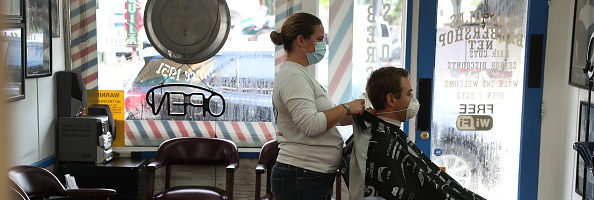
Americans support closing the economy again to combat COVID-19
In many parts of the United States, the rising number of positive coronavirus cases threatens to slow, pause, or reverse the steps that states have taken to reopen their economies. All 50 states have reopened to some extent within the last month, but the surge of cases has led some states, such as California, Florida, Michigan, and Nevada, to reinstate restrictions that were recently lifted.
To more than a fifth of Americans (21%), jobs and the economy rank as their most important issue—second overall only to healthcare (26% of US adults say this is their top issue). But even among the 21 percent who consider jobs and the economy as their top issue, more support (56%) than oppose (38%) states closing businesses and sectors that have recently reopened over COVID-19 concerns. As a nation overall, 59 percent support shuttering businesses that just reopened but are at risk for spreading coronavirus, according to an Economist/YouGov survey conducted July 19-21, 2020.
What is the overall perception of the economy?
As many states began the process of reopening their respective economies in May and June, Americans grew optimistic about the state of the economy. Perception of an improving US economy peaked at 22 percent among Americans overall around Independence Day and among those who rank jobs and the economy as their top issue, that peak sat even higher at 39 percent in early July.
Among those who consider jobs and the economy to be their top issue, these peaks in optimism are noteworty because it marks for the first time since March where more say the economy is improving than getting worse.
Late July appears to have diminished some of that optimism, especially those who say jobs and the economy is the most important issue to them. This week, just 29 percent of that group say the economy is improving, down 10 points from last week. About a third of the same group say the economy is getting worse (34%) and 48 percent of Americans overall share the same pessimism.
See the toplines and crosstabs from this week’s Economist/YouGov Poll
Methodology
:
The most recent Economist survey was conducted by YouGov using a nationally representative sample of 1,500 US adult citizens interviewed online between July 19 - 21, 2020. The approximate margin of error is 3.2 percentage points for the overall sample. Samples are weighted according to gender, age, race, and education based on the American Community Survey, conducted by the US Bureau of the Census, as well as 2016 Presidential vote, registration status, geographic region, and news interest. Respondents were selected from YouGov’s opt-in panel to be representative of all US citizens.Image: Getty